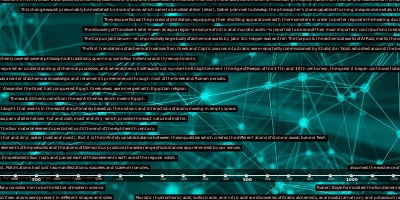Soap timeline
Category: Other
Updated: 1 Nov 2018
Contributors

Created byDina Bawazeer
Attachments
Events
first recorded evidence of the manufacture of soap-like materials in Ancient BabylonMostly used in textilesdiscovered the basic method of making soap (fats boiled with ashes and water)Mentioned in the Ebers papyrus in Egyptanimal and vegetable oils were mixed with alkaline salts to produce a soap-like substanceused for threatening sores, skin diseases as well as washing.Appeared in Greece when famous physician Galen recommended using itsaid that it was a preventive measure for skin diseases.Soap became popular in Roman EmpireSoap factory found in ruins of PompeiiRoughly around this time Ancient Germans and the Gauls started using soapThey used it to decorate their hairThey mixed ashes with animal fat to produce soapArabic chemists started producing soap in Nablus, Kufa and Basra.They were the first one to produce soaps made from vegetable oils (such as olive oil), aromatic oils (such as thyme oil) and lye.They made perfumed and colored soap, some of the soaps were liquid and others were solid. They also made special soap for shaving.Marseilles, France and Savona, Italy became soap making centersSoap making became well-known in Italy and SpainThey made it using goat fat and Beech tree ashes.French started also producing soapThey were using olive oilEuropeans started using vegetable oils (such as olive oil) instead of animal fatsFiner soaps started appearing in EuropeNicholas Leblanc patented a method of making sodium carbonate or soda ashThat was done by using commonly available saltMichael Chevreul discovered the relationship and chemical nature of fatty acids, glycerin, and fats.Andrew Pears began manufacturing a high-quality, transparent soap in LondonWilliam Gossage manufactured low-price good-quality soapRobert Spear Hudson started producing a soap powderThis was another breakthrough in soap making chemistry.Germans developed synthetic detergentsI was responsible for making the first, hard, white bars of olive oil soap.A well known soaping center was in The Castille region of SpainCastille soap is still known today as soap made with almost all olive oil.Periods
Commercial soap, as we know it today, came into existenceIndustrially manufactured bar soaps became available. This happened due to the discovery made by the 2 French chemistsa method called batch kettle boiling was used for soap production.The continuous process that decreased soap making production time to less than a day was introduced and refined by Procter & Gamble.
Comments